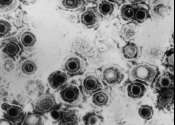Herpes simplex viruses: new relationships between epidemiology and history
An Italian research team has refined the history and origins of two extremely common pathogens in human populations, herpes simplex virus type 1 and type 2.

An Italian research team has refined the history and origins of two extremely common pathogens in human populations, herpes simplex virus type 1 and type 2.
Molecular & Computational biology
Jan 13, 2020
0
54

An analysis comparing the individual differences between over 40 strains of Zika virus (30 isolated from humans, 10 from mosquitoes, and 1 from monkeys) has identified significant changes in both amino acid and nucleotide ...
Cell & Microbiology
Apr 15, 2016
3
29

Mathematical modeling can improve the flu vaccine's effectiveness, according to experts at Rice University—where one such model has existed for more than 15 years—and its Baker Institute for Public Policy.
Mathematics
Nov 9, 2018
0
10

A team of researchers from The Scripps Research Institute (TSRI) and Janssen Research & Development (Janssen) has devised artificial peptide molecules that neutralize a broad range of influenza virus strains. Peptides are ...
Biochemistry
Sep 28, 2017
0
387

The duck genome consortium, consisted of scientists from China Agricultural University, BGI, University of Edinburgh and other institutes has completed the genome sequencing and analysis of the duck (Anas platyrhynchos), ...
Biotechnology
Jun 9, 2013
1
0
The human immunodeficiency virus (HIV) can contain dozens of different mutations, called polymorphisms. In a recent study an international team of researchers, including MU scientists, found that one of those mutations, called ...
Biochemistry
Sep 13, 2012
1
0

Influenza is a deadly virus, with about 290,000 to 650,000 deaths worldwide each year. When pandemics hit, the toll can soar: The Spanish flu of 1918 caused 40 million to 50 million deaths, the Asian flu of 1957 caused 2 ...
Biochemistry
Feb 14, 2020
0
88
(PhysOrg.com) -- In a study published September 28th ahead of print in the peer-reviewed journal Environmental Health Perspectives, researchers measured oseltamivir carboxylate (OC), the active metabolite of the popular anti-influenza ...
Environment
Oct 1, 2009
1
0

An international team of scientists led by researchers at the Max Planck Institute for the Science of Human History and the University of Kiel has successfully reconstructed genomes from Stone Age and Medieval European strains ...
Archaeology
May 10, 2018
0
206

Mexico is considered one of the leading countries in papaya productions, but its crops are usually affected by the virus of the ringed spot, which leaves ring marks in the skin of the fruit and causes softening of the papaya, ...
Biotechnology
Jan 6, 2014
0
0